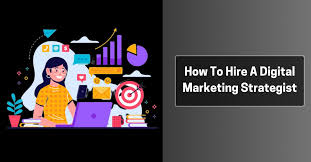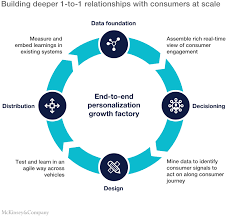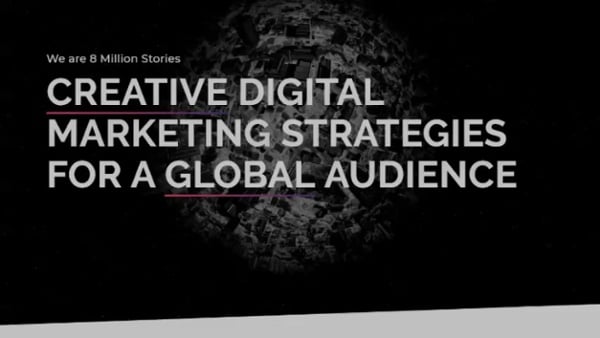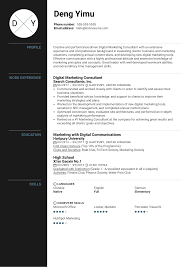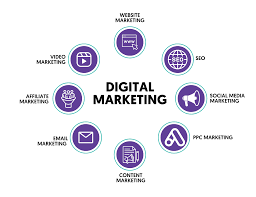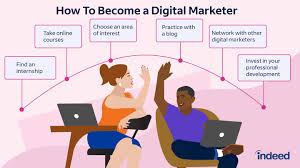The Role of a Digital Marketing Strategist
The Role of a Digital Marketing Strategist
In today’s digital age, businesses are constantly seeking ways to reach and engage with their target audience online. This is where a digital marketing strategist plays a crucial role. A digital marketing strategist is responsible for developing and implementing comprehensive digital marketing strategies to help businesses achieve their goals and grow their online presence.
Key Responsibilities of a Digital Marketing Strategist:
- Market Research: A digital marketing strategist conducts in-depth market research to understand the target audience, competitors, and industry trends. This information helps in developing effective marketing strategies.
- Strategy Development: Based on the market research findings, the strategist creates a customised digital marketing plan that outlines the goals, tactics, and channels to be used to achieve success.
- Campaign Management: The strategist oversees the execution of digital marketing campaigns across various platforms such as social media, email, search engines, and websites. They monitor campaign performance and make adjustments as needed to optimise results.
- Data Analysis: Using analytics tools, the strategist analyses campaign data to measure performance metrics such as website traffic, conversion rates, and ROI. This data-driven approach helps in refining strategies for better outcomes.
- Trend Monitoring: Staying updated on the latest trends in digital marketing is essential for a strategist to adapt strategies accordingly and stay ahead of the competition.
Skills Required for a Digital Marketing Strategist:
A successful digital marketing strategist possesses a combination of creative thinking, analytical skills, technical knowledge, and strategic planning abilities. Key skills include:
- Digital Marketing Expertise
- Analytical Thinking
- Strategic Planning
- Excellent Communication Skills
- Data Analysis Proficiency
- Adaptability to Change
In conclusion, a digital marketing strategist plays a vital role in helping businesses navigate the complex world of online marketing. By developing innovative strategies and leveraging data-driven insights, they contribute to the growth and success of businesses in today’s competitive digital landscape.
Essential FAQs About Becoming and Thriving as a Digital Marketing Strategist
- What a digital marketing strategist do?
- What is the role of a marketing strategist?
- What skills are required for Marketing Strategist?
- What skills should a digital strategist have?
- What is the salary of a digital marketing technology strategist?
- How do you become a digital strategist?
- What do Marketing Strategist do?
- What is the salary of a digital marketing strategist in India?
- Who is a digital media strategist?
- What is the role of marketing strategist?
- Is digital strategy a good career?
- What skills should a digital marketer have?
- What is the salary of a digital strategist?
- What is strategic digital marketing?
- What does a digital marketing strategist do in Google?
- What is a digital media strategist?
- What does a strategist do in marketing?
- Who is the best digital marketing strategist?
- What is the highest salary in digital marketing?
- Why a digital marketing strategist?
- What digital marketing strategist do?
- What is the difference between a digital marketing manager and a strategist?
- What does a digital marketing strategist?
- How do I become a digital marketing strategist?
What a digital marketing strategist do?
A digital marketing strategist plays a pivotal role in the online success of businesses by developing and implementing tailored digital marketing strategies. Their primary responsibilities include conducting thorough market research to understand target audiences and industry trends, creating customised marketing plans that outline goals and tactics, managing digital campaigns across various platforms, analysing campaign data to measure performance metrics, and staying updated on the latest trends in digital marketing. Through a combination of creative thinking, analytical skills, and strategic planning abilities, digital marketing strategists help businesses navigate the ever-evolving digital landscape to achieve their marketing objectives and grow their online presence effectively.
What is the role of a marketing strategist?
The role of a marketing strategist is to develop and implement comprehensive plans that guide a company’s marketing efforts towards achieving its goals. Specifically, a digital marketing strategist focuses on leveraging online platforms and tools to reach and engage with the target audience effectively. They conduct market research, analyse data, and create tailored strategies that encompass various digital channels such as social media, search engines, email, and websites. By monitoring campaign performance and adjusting tactics as needed, a marketing strategist ensures that the company’s online presence is optimised for success in today’s competitive digital landscape.
What skills are required for Marketing Strategist?
To excel as a Marketing Strategist in the digital realm, a diverse skill set is essential. Strong analytical abilities are crucial for interpreting data and making informed decisions. Creativity plays a pivotal role in developing innovative marketing campaigns that resonate with the target audience. Effective communication skills are necessary for conveying ideas and strategies clearly to stakeholders. Technical proficiency in digital tools and platforms is also vital for successful implementation of marketing strategies. Adaptability to evolving trends and a strategic mindset are key traits that enable Marketing Strategists to navigate the dynamic landscape of digital marketing effectively.
What skills should a digital strategist have?
When considering the essential skills required for a digital marketing strategist, a diverse set of capabilities comes into play. Firstly, a digital strategist should possess a deep understanding of digital marketing concepts and tools to effectively navigate the online landscape. Analytical thinking is crucial for interpreting data and deriving actionable insights to drive strategic decisions. Strong strategic planning abilities enable the strategist to develop comprehensive digital marketing plans tailored to meet specific business objectives. Excellent communication skills are essential for conveying ideas clearly and collaborating with team members effectively. Proficiency in data analysis allows the strategist to measure campaign performance and optimise strategies based on measurable results. Adaptability to changing trends and technologies is also key for staying ahead in the dynamic field of digital marketing.
What is the salary of a digital marketing technology strategist?
The salary of a digital marketing technology strategist can vary depending on factors such as experience, location, industry, and the size of the company. In the UK, the average salary for a digital marketing technology strategist ranges from £30,000 to £60,000 per year. However, experienced professionals with a proven track record of success and expertise in emerging technologies may command higher salaries. It is essential for individuals considering this career path to research current market trends and salary benchmarks to negotiate a competitive compensation package that reflects their skills and contributions in the field of digital marketing technology strategy.
How do you become a digital strategist?
To become a digital strategist, individuals typically start by acquiring a strong foundation in digital marketing principles and techniques. This often involves obtaining relevant qualifications or certifications in areas such as digital marketing, social media marketing, SEO, and data analytics. Practical experience through internships or entry-level positions in digital marketing roles can also be beneficial in gaining hands-on skills and industry insights. Continuous learning and staying updated on the latest trends in digital marketing are essential for aspiring digital strategists to develop their expertise and adapt to the ever-evolving landscape of online marketing. Networking with professionals in the field and seeking mentorship opportunities can further enhance one’s knowledge and career prospects as a successful digital strategist.
What do Marketing Strategist do?
Marketing strategists play a pivotal role in the digital landscape by developing and implementing comprehensive marketing plans to help businesses achieve their objectives. They conduct thorough market research to understand target audiences, competitors, and industry trends. Marketing strategists then use this information to create customised strategies that outline specific goals, tactics, and channels for reaching and engaging with the target audience effectively. They oversee the execution of marketing campaigns across various digital platforms, analyse campaign performance data to measure success metrics, and continuously adapt strategies based on insights gained. Ultimately, marketing strategists are instrumental in driving business growth and enhancing brand visibility in the competitive online space.
What is the salary of a digital marketing strategist in India?
One frequently asked question regarding digital marketing strategists in India is about their salary range. The salary of a digital marketing strategist in India can vary based on factors such as experience, skills, location, and the size of the company. On average, a digital marketing strategist in India can expect to earn a competitive salary that ranges from INR 4-10 lakhs per annum for entry-level positions, while experienced professionals with a strong track record may command higher salaries upwards of INR 15-20 lakhs per annum or more. It’s important to note that salaries can also be influenced by industry demand and specific job responsibilities within the field of digital marketing strategy.
A digital media strategist is a professional who specialises in developing and implementing strategic plans to effectively promote brands, products, or services across various digital platforms. They possess a deep understanding of digital marketing channels such as social media, search engines, email marketing, and online advertising. A digital media strategist leverages their expertise to create targeted campaigns that engage with the target audience and drive desired outcomes. By analysing data and trends, they refine strategies to maximise the impact of digital media efforts and help businesses achieve their marketing goals in the ever-evolving online landscape.
What is the role of marketing strategist?
The role of a marketing strategist, particularly in the digital realm, encompasses developing and implementing comprehensive plans to promote products or services effectively. A marketing strategist analyses market trends, consumer behaviour, and competitor activities to identify opportunities for growth. They craft strategies that define target audiences, positioning, messaging, and channels to reach potential customers. In the digital landscape, a marketing strategist focuses on leveraging online platforms such as social media, search engines, email campaigns, and websites to drive brand awareness and engagement. Their goal is to create impactful campaigns that resonate with the target audience and ultimately contribute to the overall success of the business.
Is digital strategy a good career?
The question “Is digital strategy a good career?” is a common inquiry among individuals considering a path in the field of digital marketing. The answer lies in the dynamic nature of the digital landscape and the increasing demand for skilled professionals who can navigate and leverage its complexities. A career in digital strategy offers opportunities for creativity, innovation, and strategic thinking, as well as the chance to make a significant impact on businesses’ online success. With the continuous growth of digital platforms and technologies, pursuing a career in digital strategy can be rewarding for those who are passionate about staying ahead of trends, analysing data-driven insights, and driving meaningful outcomes for businesses in today’s competitive market.
What skills should a digital marketer have?
When considering the skills required for a digital marketing strategist, a diverse and comprehensive skill set is essential. A successful digital marketer should possess expertise in various areas, including but not limited to digital marketing strategies, data analysis, content creation, social media management, search engine optimisation (SEO), and email marketing. Additionally, strong analytical thinking, creativity, communication skills, and the ability to adapt to evolving trends and technologies are crucial for effective performance in the dynamic field of digital marketing. By combining these skills with a strategic mindset and a passion for continuous learning, a digital marketer can excel in creating impactful campaigns and driving successful outcomes for businesses in the digital realm.
What is the salary of a digital strategist?
One of the frequently asked questions regarding digital marketing strategists is about their salary. The salary of a digital strategist can vary depending on factors such as experience, location, industry, and the size of the company. In the United Kingdom, the average salary for a digital strategist ranges from £25,000 to £50,000 per year, with senior-level positions commanding higher salaries. It is important to note that salaries may also include additional benefits such as bonuses, commissions, and healthcare packages. Digital strategists with a proven track record of success and expertise in implementing effective digital marketing campaigns are often able to negotiate higher salaries in line with their skills and contributions to the organisation.
What is strategic digital marketing?
Strategic digital marketing refers to the thoughtful planning and execution of online marketing initiatives with a clear focus on achieving specific business objectives. A digital marketing strategist plays a key role in developing a strategic approach that aligns with the overall goals of a business. This involves analysing market trends, understanding target audience behaviours, selecting appropriate digital channels, and creating tailored campaigns to maximise engagement and conversions. Strategic digital marketing goes beyond just promoting products or services online; it involves creating a cohesive and data-driven strategy that drives sustainable growth and delivers measurable results for businesses in the ever-evolving digital landscape.
What does a digital marketing strategist do in Google?
A digital marketing strategist at Google plays a pivotal role in developing and implementing comprehensive digital marketing strategies to enhance the online presence and visibility of businesses on Google’s platforms. They are responsible for conducting market research, analysing data, and creating customised marketing plans tailored to meet the goals of their clients. Additionally, they oversee the execution of digital marketing campaigns on various Google channels such as Google Ads, Google Analytics, and Google My Business. By leveraging their expertise in digital marketing trends and tools provided by Google, these strategists help businesses reach their target audience effectively and achieve measurable results in the competitive online landscape.
A digital media strategist is a professional who specialises in developing and implementing strategic plans to maximise a company’s online presence and engagement through various digital channels. They are responsible for creating targeted campaigns across platforms such as social media, websites, email, and search engines to reach the desired audience effectively. A digital media strategist combines creativity with data-driven insights to optimise marketing efforts, increase brand visibility, and drive business growth in the competitive digital landscape.
What does a strategist do in marketing?
In the realm of marketing, a strategist plays a pivotal role in shaping and executing effective campaigns to promote products or services. Specifically, a digital marketing strategist focuses on devising comprehensive plans that leverage various online platforms to reach and engage with target audiences. These professionals conduct market research, develop tailored strategies, manage campaigns across digital channels, analyse data to measure performance, and stay abreast of industry trends. By blending creativity with analytical insights, a strategist in marketing crafts compelling narratives and utilises data-driven approaches to drive business growth and enhance brand visibility in the ever-evolving digital landscape.
Who is the best digital marketing strategist?
When it comes to the question of who is the best digital marketing strategist, it is important to understand that excellence in this field is subjective and can vary depending on specific needs and goals. The best digital marketing strategist for one business may not necessarily be the best for another. Factors such as industry expertise, creativity, strategic thinking, adaptability, and proven track record of delivering results all play a role in determining the effectiveness of a digital marketing strategist. Ultimately, the “best” strategist is one who can tailor their approach to meet the unique requirements of a business and drive tangible outcomes in the ever-evolving digital landscape.
What is the highest salary in digital marketing?
In the field of digital marketing, the highest salary can vary depending on various factors such as experience, expertise, location, and the specific role within the industry. Senior digital marketing strategists with extensive experience and a proven track record of success in leading digital campaigns for large corporations or agencies are likely to command higher salaries compared to entry-level professionals. Salaries can also differ based on the region or country where the individual is employed, with major cities and hubs for digital marketing typically offering higher compensation packages. Overall, while there is no fixed highest salary in digital marketing, professionals who continuously enhance their skills and stay abreast of industry trends have the potential to earn lucrative incomes in this dynamic and competitive field.
Why a digital marketing strategist?
Businesses today need a digital marketing strategist to navigate the ever-evolving landscape of online marketing. A digital marketing strategist brings expertise in crafting tailored strategies that align with business goals, reach target audiences effectively, and drive measurable results. By leveraging data-driven insights, staying abreast of industry trends, and implementing innovative tactics across various digital channels, a digital marketing strategist plays a pivotal role in helping businesses stand out in the competitive online space and achieve sustainable growth.
What digital marketing strategist do?
A digital marketing strategist plays a pivotal role in the online success of businesses by developing and implementing tailored digital marketing strategies. Their responsibilities include conducting market research to understand the target audience and industry trends, creating customised digital marketing plans, managing campaigns across various platforms, analysing data to measure performance metrics, and staying updated on the latest digital marketing trends. With a blend of creative thinking, analytical skills, and strategic planning abilities, digital marketing strategists help businesses navigate the dynamic digital landscape and achieve their online objectives effectively.
What is the difference between a digital marketing manager and a strategist?
When comparing a digital marketing manager to a strategist, the key distinction lies in their respective roles and responsibilities within a digital marketing team. A digital marketing manager typically focuses on overseeing the day-to-day execution of marketing campaigns, managing budgets, coordinating with various teams, and analysing performance metrics. On the other hand, a digital marketing strategist is more involved in developing overarching marketing strategies, conducting market research, identifying target audiences, setting goals, and creating comprehensive plans to achieve business objectives. While both positions are essential for a successful digital marketing effort, the strategist’s focus is on shaping long-term strategies and guiding the overall direction of the marketing initiatives, whereas the manager’s role is more operational and tactical in nature.
What does a digital marketing strategist?
A digital marketing strategist plays a pivotal role in crafting and executing comprehensive digital marketing strategies to help businesses achieve their online objectives. Their primary responsibilities include conducting market research to understand the target audience and industry landscape, developing customised marketing plans that outline goals and tactics, managing digital campaigns across various platforms, analysing campaign data to measure performance metrics, and staying abreast of the latest trends in digital marketing. By leveraging their expertise in digital marketing, strategic planning abilities, analytical skills, and creativity, a digital marketing strategist contributes significantly to enhancing a business’s online presence and driving growth in the competitive digital realm.
How do I become a digital marketing strategist?
To become a digital marketing strategist, individuals typically need a combination of education, experience, and skills. A common path is to obtain a degree in marketing, digital marketing, or a related field to build a strong foundation of knowledge. It is also beneficial to gain practical experience through internships or entry-level positions in digital marketing to understand the industry dynamics and tools used. Developing key skills such as analytical thinking, creativity, strategic planning, and proficiency in digital marketing tools is essential. Continuous learning and staying updated on the latest trends in digital marketing are crucial for aspiring professionals looking to excel as digital marketing strategists.


